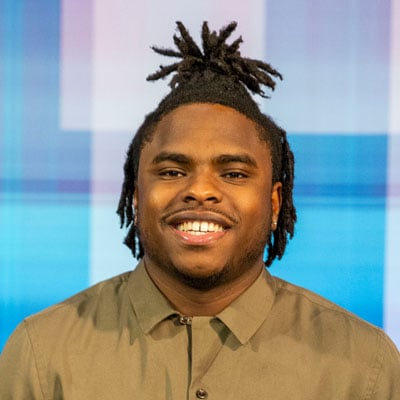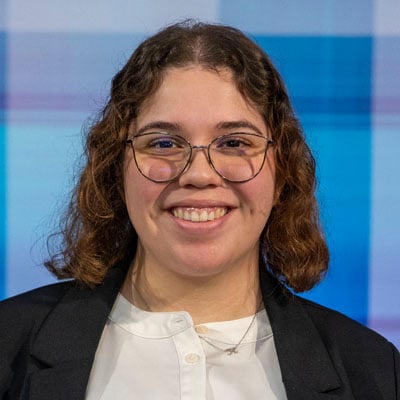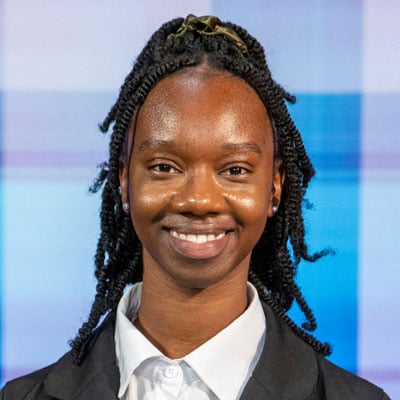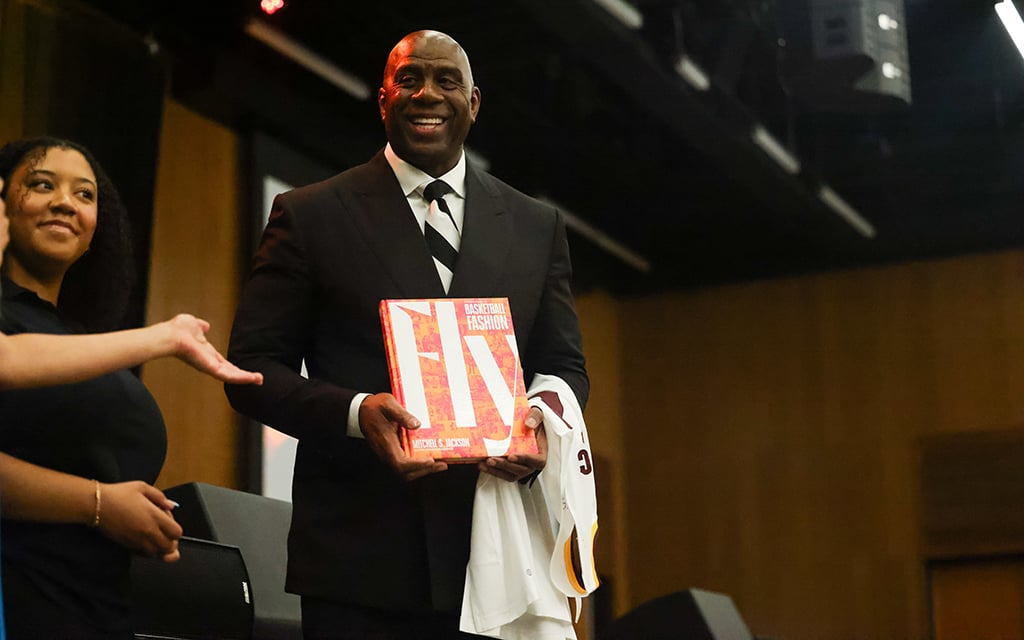
Arizona State University Black African Coalition presents ‘Fly: The Big Book of Fashion’ by Mitchell S. Jackson. (Photo by Shirell Washington/Cronkite News)
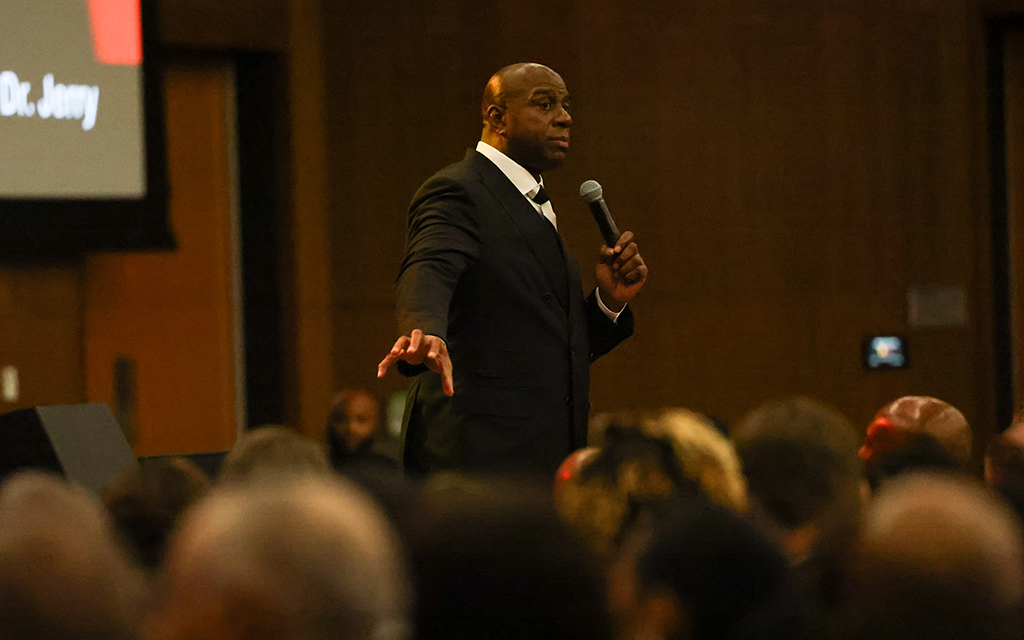
Magic Johnson shares his experiences growing up during the Civil Rights Movement. (Photo by Shirell Washington/Cronkite News)

Magic Johnson asks the crowd to wrap their arms as he begins to close out his speech about Dr. Martin Luther King Jr.’s address at Arizona State University. (Photo by Shirell Washington/Cronkite News)
PHOENIX – Magic Johnson elected not to use the elevated stage set up for him during his 20-minute speech at Arizona State University’s Student Pavilion, instead choosing to pace back and forth in front of the crowd. With a gentle, resounding voice, the five-time NBA champion chronicled his high school days and the impact of civil rights activist Dr. Martin Luther King, Jr.’s legacy on his life before a phone rang from the audience about five minutes into his speech.
“I can answer it for you and … tell them ‘Magic is here,'” Johnson told the attendee, earning a few laughs.
He indeed was there, but not to glorify himself.
About three weeks ago, he accepted ASU’s invitation to speak at the first “Building History: Continuing the Legacy of Dr. Martin Luther King, Jr.” event.
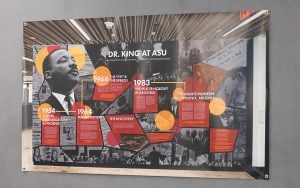
A Dr. Martin Luther King Jr. exhibit will be displayed in Durham Hall on Arizona State University’s Tempe campus. (Photo by Shirell Washington/Cronkite News)
Pastors, family members of renowned activists, city officials, students and members of the Phoenix community gathered to celebrate the 60th anniversary of King’s speech at ASU.
King delivered his “Religious Witness for Human Dignity” message in front of 8,000 people on June 3, 1964, and urged Congress to pass the Civil Rights Act of 1964. The Baptist minister told the crowd at Goodwin Stadium, the former home of the Sun Devils football team, that “the bill must pass…and it must pass soon if our nation is to maintain its health.” The bill was passed less than a month later.
Johnson started his speech by reflecting on what King desired for the country.
“It has to be a world where everyone is treated with respect and dignity, and the only thing a minority wanted was an opportunity,” Johnson said. “So when you think about his words, he wanted everyone to treat young Black people like individuals and not hate them for their race, and I’ve benefited from that message.”
Dr. Kenja Hassan, assistant vice president for the Office of Government and Community Engagement at ASU, hosted the event. She said that before Magic accepted the invite to speak, she predicted only 75 people would attend the event. About 500 people attended in-person, according to Hassan.
“This event has drawn a lot of elders, and a lot of people enjoy hearing what celebrities think,” Hassan told Cronkite News Monday after the event. “This event allows us to hear from Magic Johnson differently. We hear much from him about basketball, but we never really hear what Dr. King might mean to him. So, it’s a chance to see how different people have thought about this moment in history.”
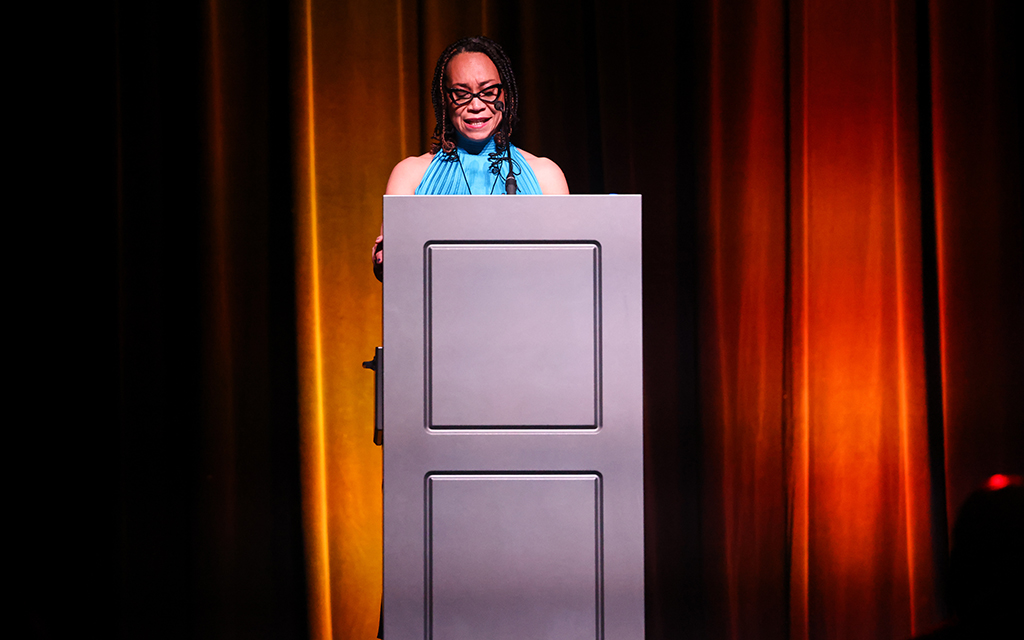
Kenja Hassan, assistant vice president of the Office of Government and Community Engagement at Arizona State University, discusses the importance of Dr. Martin Luther King Jr.’s only visit to Tempe. (Photo by Shirell Washington/Cronkite News)
Before Johnson spoke, Tempe mayor Corey Woods, Amazon senior manager of community engagement John Pombier and SodexoMagic president Charles Johnson provided remarks. However, Hassan opened the night, walking out to Martha and the Vandellas’ signature song “Dancing in the Street.” The song became “the anthem for demonstrations and riots across the country” during the Civil Rights Movement, according to CBC. Hassan called the movement, which occurred between 1954 and 1968, “tumultuous and transformative,” adding that “we live in that transformation.”
Johnson has invested in sports teams, movie theaters and restaurants through his investment company, Magic Johnson Enterprises, since its founding in 1987. He discussed how King’s advocacy for Black people securing and capitalizing on opportunity contributed to his success.
“When I think about my journey and what he (King) said versus what I’m doing today, we (businessmen) sit at the table and act like brothers, but I’m the only Black man in the room,” Johnson said. “That’s what King was talking about when he emphasized equity and taking advantage of the opportunity. I think about how he opened the doors for young men like myself. Now, it’s my job to ensure I bless others behind me.”
Johnson upheld his mission statement and donated $75,000 to ASU students Tajilynn Karim, Nia Heckler and Serenity Reynolds. The students represented ASU’s Black African Coalition, an organization devoted to uniting students of African descent. They presented the three-time Finals MVP with a custom-named number 33 ASU basketball jersey and published book “Fly: The Big Book of Basketball Fashion” by ASU professor Mitchell Jackson at the end of the event.
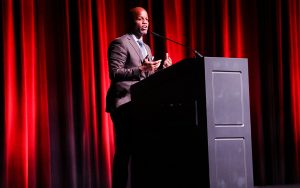
Tempe mayor Corey Woods shares the reason for changing the name of Ragsdale-MLK Park in recognition of Dr. Martin Luther King Jr.’s legacy. (Photo by Shirell Washington/Cronkite News)
“Being able to relish this moment and hear wise words from Johnson, especially with him and I both coming from the Black community where we didn’t have resources and opportunities, has been phenomenal,” said Karim, a Phoenix native.
Heckler appreciated the opportunity to draw wisdom from Johnson as well.
“Hearing him speak was so impactful, and I’m grateful to hear from him,” Heckler told Cronkite News. “This was a great opportunity, and I learned a lot.”
It was always in Johnson’s plans to steward his money meticulously so that he could elevate to a position where giving was seamless. He once told his Lakers teammates on a bus ride that “they (Lakers organization) gave the wrong Black man some money” because “he’s going to know what to do with it.”
He recalled a practice where the Lakers players became discontent with how much Johnson hung out with late Lakers owner Jerry Buss. On his own volition, Johnson prioritized meeting with Buss because he knew that Buss’ guidance was crucial to his ambitions to become a successful businessman.
“A man who is going to give me knowledge so I can take it back to the Latino and Black community to create jobs and opportunity; you want me to stop hanging out with this man,” Johnson said in response to his teammates’ displeasure. “I told the players, ‘You guys are millionaires, he’s a billionaire, I’m hanging with a billionaire.’ They got mad, but what God has put me in a position to do, I’m doing today.”
Johnson brought Starbucks to inner cities across America, and his movie theater chain “Magic Johnson Theatres” provided jobs for minorities.
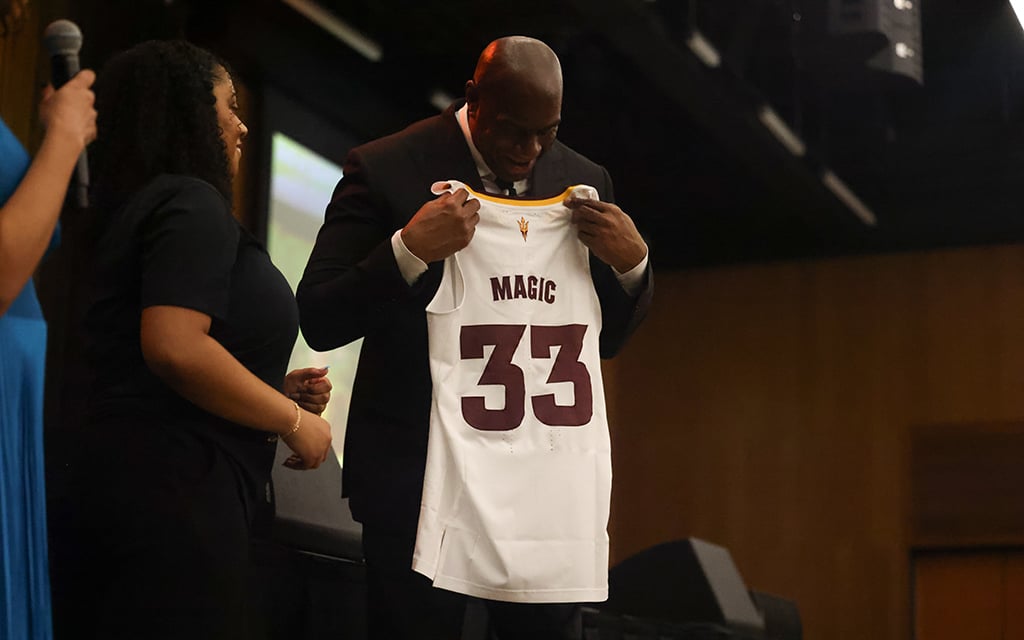
Magic Johnson receives an honorary jersey presented by ASU’s Black African Coalition members. (Photo by Shirell Washington/Cronkite News)
“We were looking for someone else to come into our community and invest, and that’s why Dr. King wanted us to come together so that we can do our own thing,” Johnson said. “In suburban America, a dollar touches nine or 10 hands. In the inner city, a dollar touches two or three hands, so that’s why we invest in our cities.”
Phoenix Suns broadcast analyst and former NBA player Eddie Johnson played with Magic on a high school summer team in Germany. Magic praised Johnson during his speech, labeling him the “one dude who has ever beaten me in a game shooting better from the outside.”
Based on his experience with Magic, Eddie believes ASU got the best speaker possible to honor Dr. King’s legacy.
“He was the right man because he’s not a liar,” Eddie told Cronkite News. “From the moment he stepped into the NBA, he was about business. The guy is magnetic, and he’s always been that way.”
Magic spearheaded a night that included soliciting a young man to the front of the stage for a chest bump, requesting water for a woman who coughed during his speech and speaking directly to a blind young Black man as people huddled around him. Johnson prioritizes cultivating interactions like those because he holds tight to King’s ability to look ahead.
To close the evening, Magic beseeched the crowd to stand and put their arms on each other’s shoulders. He followed with a prayer in which he asked for help for all to do something that King believed in: “Love thy neighbor.”
“Dr. King had great vision. He was thinking ahead of what America could look like and be like if everyone loved and respected each other,” Magic said. “I’m so blessed to take advantage of what King was preaching about.”
